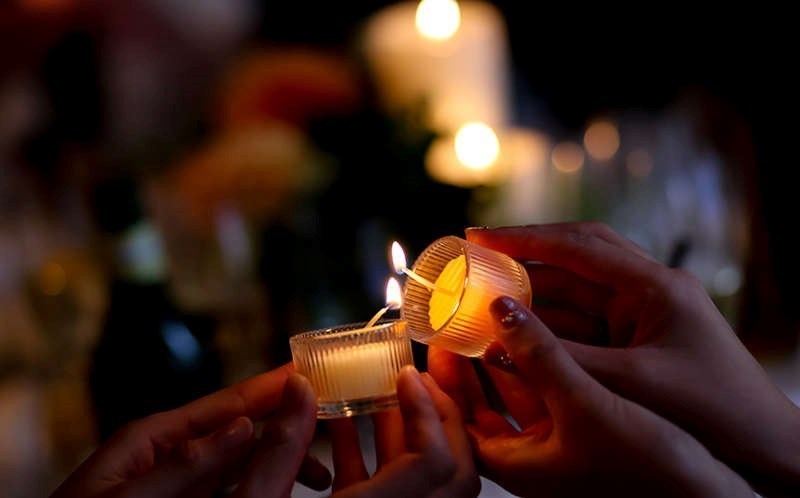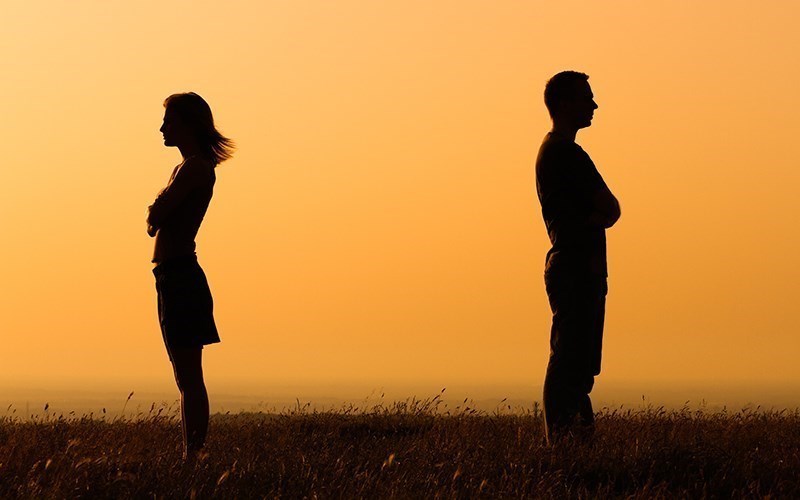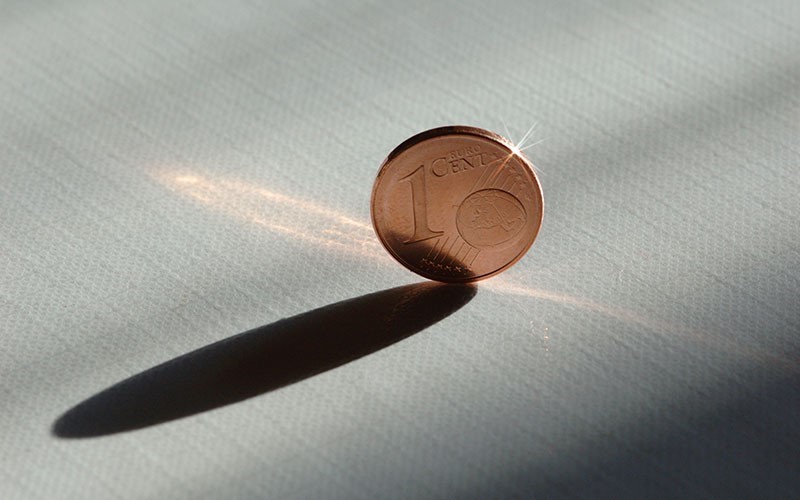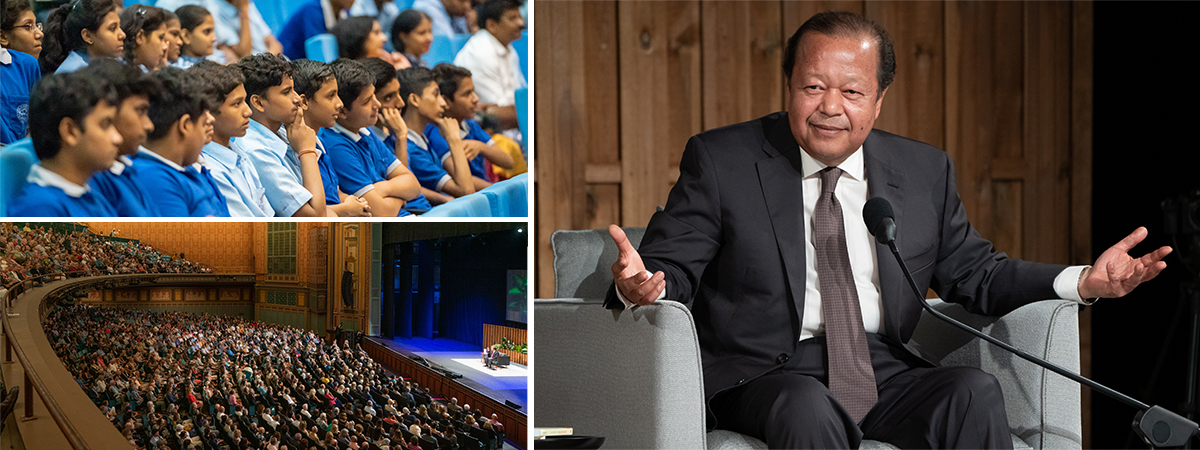Topics
 00:04:18
Light the Candle
Audio
Duration : 00:04:18
Sadness is nothing! When you bring in joy, sadness will be gone.
00:04:18
Light the Candle
Audio
Duration : 00:04:18
Sadness is nothing! When you bring in joy, sadness will be gone.
What is darkness? Is it something in itself? No! It’s the absence of light. To remove darkness, what do you do? Do you open the window; do you have a bucket? You go into a dark room, fill the bucket with darkness, and then throw it out the window? No. That’s not how you...you can’t, because it’s nothing.
So, if this is true—that darkness is absence of light and it is nothing in itself—light is something; darkness is nothing—then this would be also true for sadness. Sadness is nothing; it’s just lack of joy. Bring in the joy; sadness will be gone.
Same thing with ignorance! Bring in the knowledge and ignorance will be gone, because ignorance is only the absence of knowledge. Knowledge is something; ignorance is nothing.
So, then that will also be true for unhappiness and happiness: unhappiness is nothing; happiness is something. Bring in happiness and unhappiness will be gone.
And if this is true, then when you get unhappy, don’t you try to remove the unhappiness? When you get sad, don’t you try to remove the sadness? Well, that’s just like taking a bucket, going into a dark room, trying to fill the bucket with darkness, opening the window and throwing it out.
Because this life, full of fear, full of anger, full of jealousy, full of disappointment—that’s not the gift you were given. That’s not life. That’s not real. That’s not how it needs to be!
There’s a saying, “To fly, you don't need wings! You just have to cut off the chains that are holding you back.” There’s another saying: “Don’t curse the darkness; light the candle.” But this is what people do! They curse the darkness! They go, “Ah, this is so bad, the darkness, oh, but the....” Light the candle. And the darkness will be gone.
If you want to fly, you’re looking for wings! You don’t need wings. You have everything. Everything you need, you have. When you get to know yourself and you understand it’s all there—you have been gifted with everything—you have been blessed. Every breath that comes into you is a blessing.
In fact, peace lies neither in the realm of science nor in the realm of religion. It lies in the realm of human beings. It lies in the realm of people who feel—feel—in the realm of the heart, in the realm of you being alive. And that’s the realm of peace. That’s your realm. So far you are alive, that is your realm.
– Prem Rawat
 00:10:22
Hopes and Dreams
Video
Duration : 00:10:22
“Receive the gift, the blessing of the breath—and there is a thing that starts t...
00:10:22
Hopes and Dreams
Video
Duration : 00:10:22
“Receive the gift, the blessing of the breath—and there is a thing that starts t...
So, one day I’m thinking about hope. So I say to myself, “Well, what is hope? What’s hope?” So I grab my trusty iPad, (I’ve got a dictionary app), type in “hope.” I was standing up. I was actually standing in my office.... Yeah, I was going to, “Some inspirational meaning will come out of this dictionary....” And what it says is, “A desire to have your dreams fulfilled.”
So I sat down! I thought “hope” was this gigantic thing! It’s not! All it is—I’m not talking about whether we need it or not—but I’m just talking about what hope is. According to the dictionary, it’s “a fulfillment of our dreams!”
As human beings, we are the most unqualified creatures to have a good dream. Our dream is very, very trivial! What do we hope for? “I’m half an hour late to catch my flight, and I’m hoping the flight too is half an hour late.” That’s your—that’s your dream? That’s your hope? You’re walking down the road; you see a very beautiful girl—and what’s your hope?
You know you didn’t study in school, in the class, for that particular year—farted around. Well, you go to take the test, and you “hope you pass!” (I’m just talking about mankind’s hope—mankind’s dream! How can you talk about mankind’s hope if you don’t understand what mankind’s dream is?)
So this “fulfillment of dream” almost seems to be this entire anti-nature twist that we want accomplished—an exception to the rule, not the rule itself. We want exceptions.
That girl that’s walking down the road, you want her not to pick all the eligible people in this world, but you—when you know you’re not eligible. “Exception to the rule.”
So, our dreams, our prayers to even our God, are asking for an exception. “I don’t want to work. I don’t want to do anything; I don’t have enough brain power to make any money—but God, make me rich.”
When wishful thinking starts to merge with perceived reality, weird things happen. So, there we are; we’re walking along in the path of our life, and we just, “I want this, and I want this, and these are our hopes”—hopes!—the exception to every rule that has been made. And if it wasn’t for those rules you wouldn’t be here.
Bring together all those elements, come out of this wall, receive the gift, the blessing of the breath—and there is a thing that starts to happen, and it’s called “life.” This thing starts to move; this thing can think; this thing can grow; this thing can appreciate; this thing can laugh; this thing can understand; this thing can do amazing things. It’s called “life.”
And ninety percent of you will ponder, most of your life, “Why does it have to end?” See, because all your life you have thought about the exceptions, not the rules—because your hope is actually tied to the exception!
What is your hope? “I hope I’m going to die when I’m eighty years old. I hope I die when I’m ninety years old. I hope I die of old age!” I’ve heard that: “I hope I die of old age!” Now, tell that to Death! You won’t find it anywhere to have a conversation with, “And, hey, when are you coming for me?”
Every morning that you wake up, you wake up with two possibilities. And every moment that you live on the face of this earth, you always live with two possibilities—one is you’re alive, and one—you could go.
You don’t understand life. You attempt to make some kind of understanding happen in your brain about what death is—but you don’t understand death either.
So, heaven? In you. Hell? In you! Confusion, in you. Clarity, in you. Anger, in you. Kindness, in you! Sadness, in you! Joy, in you!
Ignorance, in you; knowledge, in you. Do you really get that? Naah. Yeah, and see that—that’s the problem! That—and yeah, and see, that is the problem. Well, if you really got that, your entire equation would change!
Because right now, “You are the cause of my anger. You are the cause of my anger; you are the cause of my anger; you are the cause of my anger.” And when you start to understand yourself, it’s like, “No, I am the cause of my anger.”
“You are the cause of my joy; you are the cause of my happiness.” And no, when you understand that, “I’m the cause of my happiness.
“You may be a catalyst, but I’m the cause of my happiness.” (Some people are not swallowing this; “I have never operated like this. And I don’t understand what you’re saying.”)
This is what knowing yourself is all about! That’s what enlightenment is all about.
Neither abandoning this world, nor accepting this world, has anything to do with your happiness.
- Prem Rawat
 00:07:14
The Magic Formula
Audio
Duration : 00:07:14
If you start practicing kindness, you will get good at it.
00:07:14
The Magic Formula
Audio
Duration : 00:07:14
If you start practicing kindness, you will get good at it.
When you get angry.... Mmm, do you ever get angry? Only three or four people in Benin get angry? Wow! I’m moving here. I mean, come on! How many of you get angry? I’m raising my hand.
And when you get angry, where does it come from? Where does it come from? In you? Wow. So, that means.... Oh, do you get angry after you leave home, ever? Mmm? After you leave home, you can get angry? Yes or no? Yes? So that means you don’t leave an-ger at home.
That means, wherever you go, the anger goes with you. Wow! So next time you go in the bathroom and close the door and think it’s private, just remember, anger just came with you. Frustration came with you. Confusion came with you. Joy came with you. Clarity came with you. Understanding came with you. Kindness also came with you.
All these go wherever you go. Do you know that? Wherever you go! This is all... This is you. See, it’s not just you. You look at yourself in the mirror and you go, “That’s me.” No, no, no, no, there’s a lot more going on. There are other ones. There’s another one of you. It’s an anger. You don’t see it in the mirror, but it’s there.
And there is one that has joy, clarity, understanding, and beauty, and kindness, and all these things. And the opposites of all of them go wherever you go. Now, the question is, what do you practice the most? Do you know what that means?
What do you practice? Every day, what do you practice? How long does it take you to get angry? Oh, so you must...you’re good at it.
You’re good at getting angry. So, if you’re good at getting angry, what does that mean? You practice anger? Oh, how long does it take for you to get afraid? How long does it take for you to get afraid? Not very long. Oh, so you practice fear?
That’s why you’re good at it. How long does it take you to lie? Did I ask a personal ques-tion? How does it take you to lie? Not very much, does it? It can just flow right away.
At home, you don’t even say “bonjour” to anybody—your wife, your friends, your chil-dren. You go outside? And it’s “Bonjour.” That’s what you practice, telling lies? You have become good at it.
So I say to you, if you start practicing courage, you will get good at it. If you start practicing kindness, you will get good at it. If you start practicing understanding, you will get good at it. If you start practicing clarity, you will get good at it. And if this is what you want in your life, that’s all you have to do. Practice what you want.
If you practice knowing yourself, you will become good at it. If you practice peace in your life, you will become good at it. That’s the magic formula. That’s how you do it.
– Prem Rawat
 00:04:00
Rain Will Come!
Video
Duration : 00:04:00
“Rain will come; be ready.”
00:04:00
Rain Will Come!
Video
Duration : 00:04:00
“Rain will come; be ready.”
Those seeds lying in the desert know one thing: rain will come. This they know. This is not a guess! Rain will come. When? They don’t know.
So, instead of looking at a calendar—like we do—they have adopted a beautiful strategy, beautiful! And it is based on one thing: rain will come.
Stop looking at the calendar. Seeds don’t look at the calendar. They just know the rain will come. And when it does, “Be ready!” So, no guesswork, no speculation. Absolutely everything known, known, known: rain will come. Be ready! And that’s what they do.
That’s how the desert blooms. You look at a desert, and it looks, “nothing,” like nothing. One color. Hiding underneath are these incredible little seeds. “Rain will come. Be ready.” And then, rain does come. And when it does, they bloom!
And when the desert blooms, it’s not monotonous anymore. It has got the most exquisite colors everywhere, the gentle hues of pink and blues and yellows and reds and green. You can’t even see the sand. It will happen.
You too can look at your life, look at the monotony of your life. But remember, in your heart there are some seeds. We’re going to talk about seeds here today quite a bit. There are some seeds. Rain will come. And the desert will bloom.
It’s happened, not once. Not once—again and again and again, and these seeds that lie dormant are the seeds of the success story from the last blooming. Those flowers that bloomed, they left these seeds behind. And this is their proof, “It does rain—and be ready to bloom.”
And, if in my life, instead of facing all the chaos that I face, all the challenges that I have created for my own self, and I start to really understand life as this incredible journey that I have, this incredible gift that I have, this incredible opportunity that I have.
- Prem Rawat
 00:02:39
A Pill for Peace
Audio
Duration : 00:02:39
Those people who are happier, and in peace with themselves, heal much faster tha...
00:02:39
A Pill for Peace
Audio
Duration : 00:02:39
Those people who are happier, and in peace with themselves, heal much faster tha...
A few days ago I was wondering what I’m going to be saying at this forum ... Medicine for Peace—I mean that’s a nice headline. But, is there really a pill for peace? Because that would be nice if there was a pill for peace. You just take it, and you have peace!
So I started thinking, “Is there a pill for peace?” And all of a sudden, I realized that there was. There actually is a pill for peace. Now I know you’re sitting there going, “What? We’re doctors. We have never come across a pill for peace. That would be too good! We could just hand you the pill—and we could take a whole bunch, right, as doctors.”
Well, that would be great. But there is a pill. And what is it?
Well, it’s called consciousness. And to tell you about it more, I will quote Dariya Maharaj. “[Hindi: दरिया सोया सकल जग, Everybody’s asleep. जागत नहीं है कोय। जागे मे फिर जागना, जागा कहिये सोय।]. (Only those who are awake, and awakened whilst awake, are truly the only ones who are awake.) That’s the pill for peace. To be awakened.
And I’ll tell you. I don’t know if there’s a scientific study been done or not. But those people who are happier, who are in peace with themselves, heal much faster than those who are worried sick. But that should tell you something.
And then—what do we do all day long? We worry! We—I mean, I’m sure, so many doctors, you know that when the patient is happy and cheerful, he will heal faster. And what do you start your day with? Worrying. The very thing you know can make you sick! Because we are not awake. We’re not awake, and that’s what it means, to be awake—in being awake. It’s so important.
- Prem Rawat
 00:07:29
Flip the Coin
Video
Duration : 00:07:29
If you have only experienced your ugliness, then you haven’t flipped the coin.
00:07:29
Flip the Coin
Video
Duration : 00:07:29
If you have only experienced your ugliness, then you haven’t flipped the coin.
MC: [Graeme Richards]
"How can you love yourself when you’ve started to believe that you’re ugly and a failure?"
Prem Rawat:
Well, fortunately it is not a fact; it’s only your belief. Beliefs can change.
Belief is like this—and I used to give this analogy. If I’m sitting with somebody, I can say, “Make believe there is a cow here. No harm done; just make believe there’s a cow here—and this cow gives a lot of milk. Just believe that, okay?”
No harm, right? [MC: Right.] But if I’m having tea, real tea, and I want some milk, rest assured this make-believe cow cannot give to my real tea. Now if I’m having make-believe tea, this make-believe cow can give a little bit of its milk for my make-believe tea. But if I’m having real tea, it doesn’t work.
There is another phase after “believing,” and that phase is called “knowing.” It’s living in reality, not just—because a lot of people say to me, when I talk about what I talk about, “Oh, come on; be real.” And the thing is, with all their fear, they’re actually the ones living in fiction. They’re the ones who are living in fiction.
You can believe anything you want, but what is the reality? What is the reality? The reality is that darkness is never far from light.
Last time you flipped on a switch and turned on a light in a dark room, how long did it take for that darkness to disappear? You turned on the light bulb, and it’s just like, djjjjjjjjjjjjjjjjjjjj, like, you know, a drain? Or like a toilet flushing, tschhhhhhhhh? No! Voom? Boomf.
Darkness is never far away from light; light is never far away from darkness. Joy is never far away from sadness, and sadness is never far away from joy. They ride together.
When you go into a bathroom and you lock the door for privacy, do you think it’s private? No, your anger, your fear, your doubt have come with you. Even though you book only one seat for yourself on a bus or an airplane, your anger, your fear, your doubt, they’re always there. Always, always!
But, so is kindness, so is understanding, so is gratitude. These things are also there, because they are the other side of the coin.
And you need to know this—that if you have only experienced your ugliness, then you haven’t flipped the coin. You need to flip the coin. Because the other side of that coin is incredible beauty.
And what is the beauty? What is the beauty? Somebody who is symmetrically shaped? A movie star? What is the beauty? Because, you know the reality of it is, how many movie stars that are drop-dead gorgeous, spend hours sometimes looking at themselves in the mirror, going, “Oh my God. Am I? Am I?”
You are the beholder. If you feel in you—and see, I keep going back to this, and this is a great question, because this gives me more ammunition for my book—that’s why you need to know yourself!
Socrates said, “Know thyself.” You need to know yourself. Why do you need to know yourself? Because that is when you will be able to experience the true beauty that you are. That’s why you need to know yourself.
There’s a billion reasons, I think, 7.5 billion reasons on the face of this earth of why you should know yourself. Because if each one did, I think we would have a very different situation in this world; if the beauty that you conceive in your mind is beauty, that is different than you truly are.
See with the eyes. See the wonderment. The children—and, gorgeous! They look at something incredible, and they’re in awe! In awe!
And of course, the stupid parent going, “That’s the moon.” They could care less. They fell in love with the moon before the stupid dad said—or stupid mom said—“That’s the moon.” They saw the moon that doesn’t have a name, and they loved it. That’s beauty—and you have that beauty.
Whatever other people tell you, you are worse than them, because you constantly sit there and tell yourself, “I’m not beautiful; I’m not beautiful; I’m not....”
This beauty will be gone one day. The same thing that people come and kiss, they will be like, “Huh-huh, no way.”
So, it’s not here—this is not the “beauty” part. The beauty part is here, in your heart, in yourself.
- Prem Rawat





